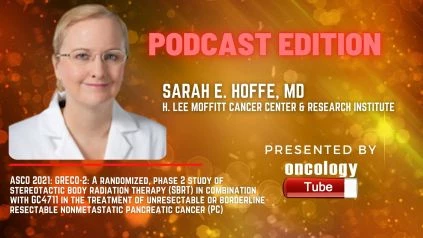Sarah E. Hoffe, MD from H. Lee Moffitt Cancer Center & Research Institute speaks about ASCO Abstract – GRECO-2: A randomized, phase 2 study of stereotactic body radiation therapy (SBRT) in combination with GC4711 in the treatment of unresectable or borderline resectable nonmetastatic pancreatic cancer (PC).
Link to Abstract:
https://meetinglibrary.asco.org/record/201242/abstract
Background information:
While systemic therapy for PC has improved, surgical resection, which is regarded the best therapy, remains uncommon. Patients with unresectable or borderline PC continue to have dismal outcomes, with toxicity and disease progression during induction chemotherapy limiting the number of patients who may be surgically treated. SBRT practice has turned to greater dose administration to improve margin negative resection or give local control if inoperable following neoadjuvant therapy (Mellon 2015, Colbert 2018), however timing and proper patient selection are still up for discussion. When compared to traditionally fractionated RT, SBRT treatment beyond 50 Gy demonstrates greater cell death, although it carries the risk of GI toxicity (Zhong 2017). Superoxide is converted to hydrogen peroxide by GC4711, a selective superoxide dismutase mimic. Dismutase mimetics, as radiation response modifiers, offer the potential to improve tumor management without jeopardizing radiation safety (Sishc, AACR 2019). In PC experimental xenograft mice models, GC4711 consistently improved tumor control when combined with SBRT. Subjects with locally advanced PC were randomized to undergo SBRT plus either the selective dismutase mimic GC4419 or placebo in a pilot phase 1/2 experiment (GC4419-101). This pilot study found that SBRT (5 10-11 Gy) was safe and effective, with improvements in survival, surgical resection, locoregional control, and time to distant metastases. Overall, our findings support the concept that GC4711 may enhance tumor outcomes and the benefit-risk ratio of 50Gy 5-fraction SBRT by boosting effectiveness while reducing GI toxicity.
Methodologies:
GRECO-2 is a phase 2 multicenter, randomized, double-blind, placebo-controlled research to see if adding GC4711 to SBRT after 4 months of chemotherapy improves overall survival in people with unresectable or borderline non-metastatic PC. GC4711 100 mg or placebo IV delivered as IV infusion over 15 minutes prior to each of 5 SBRT segments of 10Gy) will be administered to approximately 160 participants at over 20 locations. Subjects that are deemed operable will be investigated within 8 weeks after receiving SBRT. All individuals will receive adjuvant treatment for a further two months. Overall survival is the primary endpoint, with secondary endpoints including resection rates, local and distant disease progression, and safety, as well as exploratory studies such as ctDNA, tumor exome/transcriptome sequencing, immune profiling, patient-reported symptoms (PRO-CTCAE), CA19.9 normalization, and radiomics. Advances in Radiation Oncology (2018) 3, 693-700, Colbert L, Rebueno N, Moningi S, et al. Acta Oncologica, 2015;54:7 Mellon EA, Hoffe SE, Springett GM, et al Cancer. 2017 Sep 15;123(18):3486-3493. Zhong J, Patel K, Switchenko J, et al. BJ Sishc, D Saha, and MD Story. C52, AACR PADC 2019.
Clinical trial information: NCT04698915 –
http://clinicaltrials.gov/show/NCT04698915

